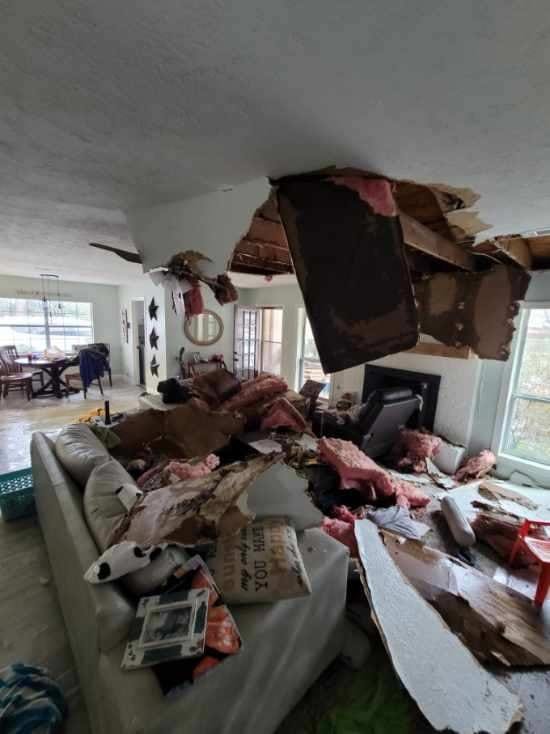Freeze overwhelms plumbing companies, depletes repair supplies
As Winter Storm Uri bore down on the Katy area, one thing many homes were unprepared for is the cold weather’s impact on plumbing. Pipes in Texas homes are often placed in crawl spaces designed …
This item is available in full to subscribers.
Attention subscribers
To continue reading, you will need to either log in to your subscriber account, below, or purchase a new subscription.
Please log in to continue |
Freeze overwhelms plumbing companies, depletes repair supplies
As Winter Storm Uri bore down on the Katy area, one thing many homes were unprepared for is the cold weather’s impact on plumbing. Pipes in Texas homes are often placed in crawl spaces designed to move air and reduce humidity in the area above the home and are only lightly insulated – causing disastrous water outages and damage during severe winter weather.
“The attic space is just like a wind tunnel to get that humidity out of the attic because if it gets trapped up there, you’ve got moldy (conditions),” said Paul Obsta of Obsta Plumbing.
Paul said that feature was by design because, unlike homes in the north where construction is designed to keep heat in the home and cold out, southern homes are designed to prevent humidity from accumulating and to keep cold inside the home, making homes ill-prepared for conditions such as that brought about by Uri.
Dorinda Obsta, Paul’s wife and business partner, said the winter storm had caused Obsta Plumbing, like most other plumbers in the area, to be overwhelmed with calls. While the plumbing community is working hard to address problems as quickly as they can, many have an overwhelming amount of work to take care of, she said.
At the time of the interview, the Obstas had more than 600 homes on a waiting list to try to help, but with only five plumbing crews to dispatch and a shortage of repair parts across the state, some homeowners could be waiting a while for repairs.
“We had to filter everything to booking online only,” Dorinda said. “That way we could truly manage a first-come-first-served basis and handle people because we didn’t want people jumping in line.”
What to do now
The Obstas said their five trucks that usually run three calls a day on a regular full-time schedule are now working five calls per day and working 18-hour days in order to try to facilitate repairs quickly.
While most insurance companies don’t cover plumbing repairs, Paul said, they will usually cover water and property damage caused by broken pipes and serious plumbing leaks. However, depending on the situation, those expenses may be provided through reimbursements rather than upfront payments to homeowners or renters and generally, plumbers do not work with insurance companies for the cost of repairs they complete.
The Obstas recommended that homeowners who need repairs make appointments as needed with plumbers in the area but asked that extraneous appointments be canceled proactively to help plumbers manage their workloads. They said plumbers will understand area residents calling around to get the first available plumber to do the work and thus won’t be upset by the cancellations that help them manage an extraordinary workload.
Prepared for the future
The Obstas also recommended proactively looking over plumbing and looking at what preventive measures can be put in place to ensure plumbing is protected from severe weather as much as possible.
Steps residents can take include purchasing covers for outdoor spigots, reviewing owners manuals for sprinkler systems, knowing how to turn water heaters off and on, and knowing where the master valve for the home’s water main is located.
“The most important thing if you are in a house is to know where the shutoff valve is, and if there’s not one, to know how to shut the water off at the street,” Dorinda said. “Because if you can do those two things, you can mitigate damage, big time.”
Cutting off the water at the street often requires a special tool called a water key, Dorinda explained. The part usually sells for less than $15 and is available at some local hardware stores and online.
Residents should also ensure their renters and homeowners insurance is up to date and understand the water damage coverage offered by their insurance, Dorinda said.
Avoiding scams
The Obstas said disasters such as Winter Storm Uri and Hurricane Harvey, are often big draws for scammers posing as plumbers or handymen. To avoid scams, the Obstas recommended customers request the plumbing professionals license which is issued by the State of Texas.
“Always ask for their credentials,” Paul said. “… The Homeowner can request to see their license at any moment in time, so if (a plumber) walks into (a resident’s) house and they say, ‘I want to see your license.’ That plumber is supposed to produce that license at that point.”
If the plumber does not have the license on them at the time, it is possible to verify the plumber’s credentials by searching for the plumber or plumbing company on the Texas State Board of Plumbing Examiners’ website, the Obstas explained.
Plumbers are also required to carry appropriate insurance as well, and evidence of that insurance must also be provided on demand they said.
Anyone suspecting price gouging for plumbing services or any other disaster-related event should contact their county attorney’s office. Harris County has set up a hotline at 832-471-1600 while Fort Bend County residents can email reports of price gouging to ReportGouging@FortBendCountyTx.gov.
Keywords
Obsta Plumbing, Winter Storm Uri






